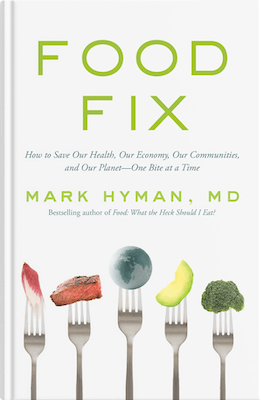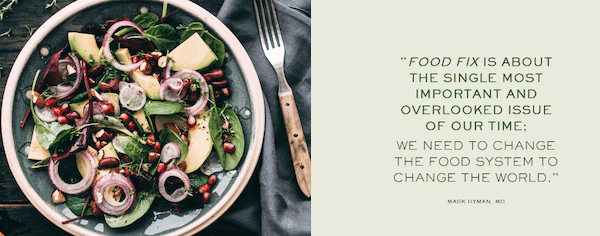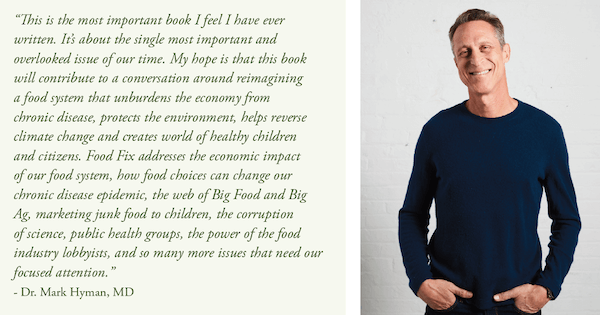
Dr. Mark Hyman has a brilliant new book called called Food Fix: How to Save Our Health, Our Economy, Our Communities, and Our Planet – One Bite at a Time and his big bold message is that: “We need to change the food system to change the world.” It is an issue that is seriously overlooked and he wants to change this.
Watch this short video clip to hear it from Dr. Hyman himself.
Here are some of the key messages from Food Fix
- If we don’t change the food system, we’re going to spend $95 trillion dollars on chronic disease – heart disease, obesity, type 2 diabetes, cancer, and dementia – over the next 35 years.
- Big food spends a lot of money in Washington to keep us fat and sick.
- The food industry preys on our most vulnerable citizens – children.
According to the American Psychological Association, children under the age of 8 don’t instinctively recognize the difference between TV Commercials and programs, which makes them particularly vulnerable.
- Big Food buys partnerships with public schools.
- Minorities are also targeted by the food industry.
Researchers at the University of Connecticut found that junk food companies spend the most on ads that target African Americans and Spanish speakers. Guess which products were most heavily advertised toward minorities—Gatorade, Pop Tarts, Twix Candy Bar, Cinnamon Toast Crunch Cereal, and Tyson Frozen Entrees
The worse the nutritional profile the more heavily the products were promoted through advertising.
Where are the broccoli ads?
These findings, the researchers noted, “highlight important disparities in the food and beverage industry’s heavy marketing of unhealthy foods to Hispanic and black youth, and the corresponding lack of promotion of healthier options.”
- Bad food is making us anxious, depressed, and is messing with our brains. I’m thrilled that Dr. Hyman highlights how nutritional medicine is a key to mental health and psychiatry. Here are some snippets :
Studies show that adults with many types of mental health issues and children with ADHD have very low levels of antioxidants (which come from fruits and vegetables), such as the fifty-six-year-old man with lifelong crippling depression who improved by cleaning up his diet and taking a cocktail of B vitamins. I remember one man who presented with severe panic attacks every afternoon. Turned out he was eating a diet very high in sugar and starch and had wild swings in his blood sugar, which triggered the anxiety. When he cut out sugar and starch, his anxiety and panic attacks vanished. These stories are not anomalies. They are predictable results from applying nutritional medicine.
In recent years, major medical journals have clearly shown the link between nutrition and mental health. The Lancet Psychiatry, a top medical journal, maps out just how nutritional medicine is a key to mental health and psychiatry. Overall diet quality, high sugar loads, and rampant nutritional deficiencies (including omega‑3 fats, zinc, magnesium, vitamin D, and B vitamins) all drive mental illness. In other words, the culprit is once again the American and increasingly global industrial diet. We have discussed the costs of obesity and chronic disease, but most don’t connect mental illness to the costs of chronic disease. In fact, the cost of mental illness to the economic burden is far greater than the costs of heart disease, diabetes, and cancer.
Population studies have found that more fruits and vegetables and less french fries, fast food, and sugar are associated with a lower prevalence of mental illness, and that junk food creates moderate to severe psychological distress. The good news is that interventional studies have shown that treatment of mental illness with diet works well (especially since most medications for mental illness don’t work that well, despite being the second biggest category of drugs sold).
And here are a few of the many solutions proposed in the book:
- Support regenerative agriculture and sustainable food.
- Stop purchasing franken-foods:
Today 60% of our diet is ultra-processed food made from commodity crops—corn, soy, and wheat—that’s turned into various sizes, shapes, and colors from the raw materials—high fructose corn syrup, white flour, and refined soybean oil. When you vote with your dollars and your fork to stay away from these foods, you send a message to big food to stop subsidizing commodity crops and grow more fruits and vegetables!
- End food waste:
Buy only what you need. If food may go bad soon, make a soup or stew. Get a compost bucket for your kitchen. Start a compost pile in your backyard, or buy an in-home composter. Use it in your garden or donate it to someone who has a garden.
- Be an activist and teach your family why food matters.
- Address food deserts and food swamps in African American communities, and recognize that this is:
“food apartheid,” an embedded social and political form of discrimination.
Here is the official book blurb:
Help to transform the planet in crisis with this indispensable guide to healthy, ethical, and economically sustainable food from #1 New York Times bestselling author Mark Hyman, MD.
Food is our most powerful tool to reverse the global epidemic of chronic disease, heal the environment, reform politics, and revive economies. What we eat has tremendous implications not just for our waistlines, but also for the planet, society, and the global economy. What we do to our bodies, we do to the planet; and what we do to the planet, we do to our bodies.
In Food Fix, Mark Hyman explains how our food and agriculture policies are corrupted by money and lobbies that drive our biggest global crises: the spread of obesity and food-related chronic disease, climate change, poverty, violence, educational achievement gaps, and more.
Pairing the latest developments in nutritional and environmental science with an unflinching look at the dark realities of the global food system and the policies that make it possible, Food Fix is a hard-hitting manifesto that will change the way you think about – and eat – food forever, and will provide solutions for citizens, businesses, and policy makers to create a healthier world, society, and planet.
I love that Dr. Hyman says he is left with a sense of hope and possibility after writing this book … “understanding the problems and challenges we face sets the foundations for the solutions.”
Wise words indeed! This book is much-needed, brilliant, eye-opening and shocking at times, but hopeful and solution-based.
You can get your copy of Food Fix here (my Amazon link) and find additional information and resources on the official book site here.


Thanks for your encouragement! I have already purchased the book and have started to read. This will be a great book to read and educate those who need to understand how important healthy nutrition has become.
Karen
Wonderful – hope you’re enjoying it! Feel free to share some gems you’ve picked up here in the comments
Thank you Trudy!
There is no doubt in my mind that “the food system” is the (burning) issue that impacts our lives in detrimental ways. This book appears to present “the foundations for the solutions.” I’d very much like to see to what these “foundations” are! I invite the possibility of being gifted with the book for a careful reading plus blogging my commentary at CureZone.com.
In the video clip Mark makes brief mention of people having “a lot more power than we think” and he apparently gives three examples by saying: “we can vote with our fork … our dollar and … our vote.” A healthy skepticism can question the effectiveness of these examples when they are considered in light of the severities of this issue plus the urgency for “change” – that Mark identifies as the need “to transform the planet in crisis.” One can only wonder why this crisis exists when we have had our “forks, dollars and the vote” for longer than any individual alive today? ………
Is it possible that we need more than “our forks, dollars and the vote”? ……… Is “a lot more power than we think” something to be discovered in these three examples or does the power lie beyond these things? ………
Consider the need for personal transformation before attempting to “to transform the planet in crisis.” –
We need to transform ourselves before we can effectively change a system that has entrenched itself in the American psyche virtually since the “Civil War.” Our quintessential transformation goes beyond “forks, dollars and the vote.” Believe it or not – “dollars” and “the vote” are actually part of the crisis! These three “examples” do not give people “a lot more power than we think.” The real crisis is not revealed simply by pointing to the system – not unless that includes the historical disempowerment of the people. The crisis of the people’s power is what needs to be seen before “understanding the problems and challenges we face …”
–
Chef-doctor Jemichel
Thanks for contributing to the discussion! I wholeheartedly agree that we need to work on ourselves first and then consider how we can help the planet and others. This book is really for folks who are further along in their healing journey and for practitioners, food advocates, bloggers who have a big platform and reach, politicians etc.
I encourage you to purchase a copy yourself – you won’t be disappointed and nor will your community! I am frequently gifted books to review and always purchase a copy amyway so I can support the writer (as an author I know the amount of work it takes to write a book!)